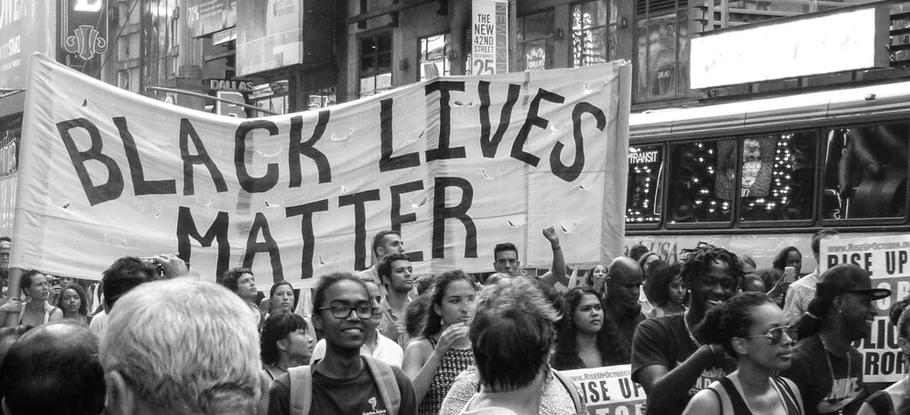On May 25th 2020, the video of the mistreatment and subsequent death of George Floyd was a bombshell that rocked our nation. Within hours of the video that surfaced with officer Derek Chauvin on the neck of George Floyd, protests and subsequent city-wide riots broke out in Minneapolis and eventually, throughout the nation. Organizers of these protests continue to use the #BlackLivesMatter or #BLM hashtag as they call for justice in the case of Floyd.
Black Lives Matter was born during the height of the controversy surrounding the George Zimmerman trial in 2013. What started as a simple hashtag quickly grew into a cultural movement and subsequently—an entire social justice organization.
According to Herbert G. Ruffin II, the Black Lives Matter movement builds on past civil rights movements and infuses intersectionality as a means of fueling the new social justice movement. He writes:
Its organizational structure builds on the legacy of earlier reform campaigns, including the civil rights/black power movement, Pan Africanism, Africana womanism, the LGBT movement, and the Occupy Wall Street movement while using cyber activism to promote its agenda. Specifically, Black Lives Matter puts the feminist theory of “intersectionality” into action by calling for a united focus on issues of race, class, gender, nationality, sexuality, disability, and state-sponsored violence. [1]
If anyone should value life—including the lives of Black people—it should be the Church of Jesus. While every single Christian, regardless of ethnicity, should desire justice in the case of George Floyd, that doesn’t mean that Christianity must be baptized into the woke movement of #BlackLivesMatter whose worldview is rooted in ethnic partiality.
This is certain for several reasons, which I will detail in this article, but at the end of the day we must remember that Christianity is the world’s greatest message and if we as Christians will see real peace, love, and unity—it will only be through the gospel of Jesus.
The Radical Social Justice Agenda of #BlackLivesMatter
According to the Black Lives Matter website, they exist to work for “freedom, liberation, and justice.” They have a new agenda in 2020 called, #WhatMatters2020 which is described as follows:
BLM’s #WhatMatters2020 is a campaign aimed to maximize the impact of the BLM movement by galvanizing BLM supporters and allies to the polls in the 2020 U.S Presidential Election to build collective power and ensure candidates are held accountable for the issues that systematically and disproportionately impact Black and under-served communities across the nation. [2]
Notice the language of “power” which seems to be the central goal of the organization. They want to gain power so that they can change power structures within major arenas like the powerful seats of office within American politics and beyond. The woke social justice movement has mortally wounded the university system in our nation, negatively impacted businesses, and has now been infused within evangelicalism.
We continue to see this movement working through evangelical circles as proponents of social justice demand equality and continue to make the claim of ongoing present systemic racism that is dominating evangelicalism.
Pastor Eric Mason, the founding pastor of Epiphany Fellowship in Philadelphia, Pennsylvania and the author of Woke Church defines “woke” as an “urban colloquialism used by black nationalists and those who are in the black consciousness movement” to describe becoming fully aware of “the systemic, sociological, economic and comprehensive disenfranchisement of African-Americans.” In his book, he writes,
Colorblind theology denies Christ’s power to heal racial divisions, disparities, and injustices by ignoring their ongoing impact. Colorblind theology undermines unity in the church by refusing to acknowledge significant ethnic differences or address significant problems. [3]
Mika Edmondson addressed the Council of The Gospel Coalition in 2016 where he answered the question—“Is Black Lives Matter the New Civil Rights Movement?” In his address, he said the following, “I strongly recommend full engagement with the concept and critical engagement with the movement, especially since there’s no evangelical alternative to Black Lives Matter.” Is that true? I would argue that the Church of Jesus is the best place to minister and mobilize to make disciples who find their joy in Christ Jesus. Edmondson goes further to say:
Why am I not as torn up over this as non-Christians are? Why is Black Lives Matter more torn up over black people dying than [Christians] are? . . . They have more moral sense than we do! How can Black Lives Matter see the value of black life better than we can? [4]
I would argue that the Church of Jesus is torn up over the injustices of this world, but we grieve differently than the world and we have different goals than Black Lives Matter. The reason the Church looks different than Black Lives Matter is based on a fundamental goal of the movement itself. Black Lives Matter is about disrupting and changing power structures and the Church is about changing hearts with the good news of Jesus.
We can see the goal of disruption and political goals during a press conference in Atlanta for Mayor Keisha Lance Bottoms to speak as the riots broke out in the city following George Floyd’s death. After she spoke, she turned over the microphone to a hip-hop artist named “Killer Mike” who approached the microphone with a shirt that read, “Kill Your Masters.” This is what he communicated to the citizens of Atlanta while rioters were busting windows of businesses, looting property, and burning police cars in the streets:
It is your duty not to burn your own house down for anger with an enemy. It is your duty to fortify your own house so that you may be a house of refuge in times of organization, and now is the time to plot, plan, strategize, organize, and mobilize. It is time to beat up prosecutors you don’t like at the voting booth. It is time to hold mayoral offices accountable…I’m mad as hell. I woke up wanting to see the world burn down yesterday because I’m tired of seeing black men die…we want to see the system that sets up for systemic racism burnt to the ground. [5]
He then finished his speech by encouraging people to register to vote and go to the polls in November and vote by exercising “bully power” to beat up politicians that “you don’t like.” He encouraged people to vote for progressive politicians who would legalize marijuana and topped it off by calling the President of the United States a “Dumbass President.” This is social justice 101, and it capitalizes on tragedy and emotions as a campaign to further their own agenda.
This is not the way of Jesus. Our God is the God of justice—he created justice—and our justice system is designed in such a way as to reflect the justice of God. Although our justice system is imperfect and upheld by imperfect people, we are called to be people of peace, law, and order. Christians are commanded to love God supremely and to love our neighbor as ourselves. Anyone who diminishes the value of human life and engages in ethnic prejudice is denying the way of Jesus. The Statement on Social Justice and the Gospel describes the Imago Dei in the following way in Article II:
WE AFFIRM that God created every person equally in his own image. As divine image-bearers, all people have inestimable value and dignity before God and deserve honor, respect and protection. Everyone has been created by God and for God.
——
WE DENY that God-given roles, socioeconomic status, ethnicity, religion, sex or physical condition or any other property of a person either negates or contributes to that individual’s worth as an image-bearer of God.
The modern social justice agenda is not about equality and civil rights—it’s about disrupting systems of power and gaining power in order to accomplish their progressive political agendas.
The Lawlessness and Injustice of #BlackLivesMatter
As I write this article, the rage continues in the streets of America under the banner of #BlackLivesMatter. Lawlessness and anarchy abounds. Major cities are at a boiling point with businesses being burned and looted, police cars burned and damaged, graffiti messages of “BLM” are being painted on monuments and government buildings, police stations burned, and police officers attacked.
Black Lives Matter is built on a postmodern foundation that has a goal of deconstruction. Notice the language of “disruption” as one of their functional goals:
We disrupt the Western-prescribed nuclear family structure requirement by supporting each other as extended families and “villages” that collectively care for one another, especially our children, to the degree that mothers, parents, and children are comfortable.
This methodology of disruption and deconstruction finds its source in Jacques Derrida, a postmodern philosopher. The goal is to dismantle and deconstruct power structures, organizations, entities, Christian denominations, athletics, universities, and especially political structures. This agenda is clearly visible as Black Lives Matter promotes the hashtag #DefundThePolice.
During these riots, police officers have been verbally abused and viciously attacked. The very men and women who put their lives on the line to serve and protect the citizens of our communities every single day are now the daily recipients of the rage of unjust mobs who are looking to take out their frustration in an unjust manner on innocent officers. During these attacks, not one message has been issued on social media by Black Lives Matter to denounce such rage and violence. Graffiti in Oakland, California was captured on the wall that reads, “Kill one back…”
This is not the teaching of Jesus. The Church of Jesus Christ should reject any movement that applauds and supports this type of lawless and reckless behavior. Jesus said:
Beloved, never avenge yourselves, but leave it to the wrath of God, for it is written, “Vengeance is mine, I will repay, says the Lord.” To the contrary, “if your enemy is hungry, feed him; if he is thirsty, give him something to drink; for by so doing you will heap burning coals on his head.” Do not be overcome by evil, but overcome evil with good (Romans 12:19–21).
In his famous Sermon on the Mount, Jesus said the following:
You have heard that it was said, ‘An eye for an eye and a tooth for a tooth.’ But I say to you, Do not resist the one who is evil. But if anyone slaps you on the right cheek, turn to him the other also. And if anyone would sue you and take your tunic, let him have your cloak as well. And if anyone forces you to go one mile, go with him two miles. Give to the one who begs from you, and do not refuse the one who would borrow from you (Matthew 5:38–42).
The lawless behavior of the protests under the banner of Black Lives Matter is simply not the teaching of Jesus nor should it be supported by Christians.
The Religion of #BlackLivesMatter
From the very beginning, Christians have written out creeds and statements of belief that articulate key positions and doctrines. Such statements of belief provide clarity on key positions and doctrines that govern how we live, worship, and serve God.
If you visit the “What We Believe” page on the Black Lives Matter website, you will see that their stated beliefs and key positions do not align with a Christian worldview and outright deny key Christian doctrines. In fact, they stand opposed to Christian doctrine on several essential issues:
- Human Sexuality
- Ethnic Prejudice
- Marriage
- Family
- Social Engagement
Black Lives Matter is more than a movement, it’s a religion. A black man approached a white woman in the name of Black Lives Matter in New York and asked her to get onto her knees and apologize for her white privilege. At one public rally in Maryland (*I do not endorse the full video, but you can at least see the video footage), white people by the hundreds are being asked to publicly repent of racism before black people and recite a confessional creed as an open apology for their sins.
Black Lives Matter serves as a corrupt denomination within the social justice religion. It’s gospel is a social gospel rather than the true gospel of Jesus. It has more in common with common criminals than it does the Church of Jesus Christ. The key doctrines, principles, and practices of the organization do not align with Jesus Christ. The social justice movement is morphing into a confused modifier for gospel. In other words, if you are unwilling to accept social justice—or in this case, Black Lives Matter, many people will not consider you to be Christian.
There is a better way to grieve and a better way to stand against injustice than locking arms with Black Lives Matter. Remember, God’s plan for his people was not a social justice organization—it’s the local church. The message we have is far superior than the message of Black Lives Matter. We must remember the strong words of Paul to the Church at Galatia as he grieved that the people had opened the church to a false gospel. Paul said the following:
But even if we or an angel from heaven should preach to you a gospel contrary to the one we preached to you, let him be accursed. As we have said before, so now I say again: If anyone is preaching to you a gospel contrary to the one you received, let him be accursed (Galatians 1:8–9).
Do not be fooled or shamed into embracing a godless anti-gospel message. Don’t trade your gospel for a false gospel. Remember the message that Paul goes on to preach to the church in Galatia as he points to the cross of Jesus as our ultimate hope and means of unity with God and our fellow man. He writes:
But now that faith has come, we are no longer under a guardian, for in Christ Jesus you are all sons of God, through faith. For as many of you as were baptized into Christ have put on Christ. There is neither Jew nor Greek, there is neither slave nor free, there is no male and female, for you are all one in Christ Jesus. And if you are Christ’s, then you are Abraham’s offspring, heirs according to promise (Galatians 3:25–29).
Paul is not arguing against the reality of gender distinction or ethnic distinction—but what he does in this text is demonstrate the beauty and power of the gospel. The very people who are the most different, distinct, and in many ways—opposites on a social level—are brought into a familial bond where they are literally brothers and sisters through the blood of Jesus. Black Lives Matter can never achieve such goals.
Black Lives Matter is an anti-gospel movement fueled by postmodern social justice. The Black Lives Matter organization will never lead communities to peace, harmony, and unity.
Do Black lives matter? Yes, in fact, all lives matter and we see this clearly articulated in the pages of Scripture. All people are created in the image of God (imago dei) and all human life should matter to the Church of Jesus.
Dear Christian—follow Jesus, do justice, and walk humbly with our God.
This article was originally published on DeliveredByGrace.com.
- Herbert G. Ruffin II, “Black Lives Matter: The Growth of a New Social Justice Movement” [Accessed 6/2/2020]
- #WhatMatters2020 is a campaign of the Black Lives Matter organization. You can access this information at: https://blacklivesmatter.com/what-matters-2020/
- Eric Mason, Woke Church: An Urgent Call for Christians in America to Confront Racism and Injustice, (Chicago: Moody, 2018), 106.
- Mika Edmondson, “Is Black Lives Matter The New Civil Rights Movement?” [Accessed 6/4/2020]
- Killer Mike Speech at Mayoral Press Conference During Atlanta Riots 2020: https://youtu.be/Vy9io6VEt58



